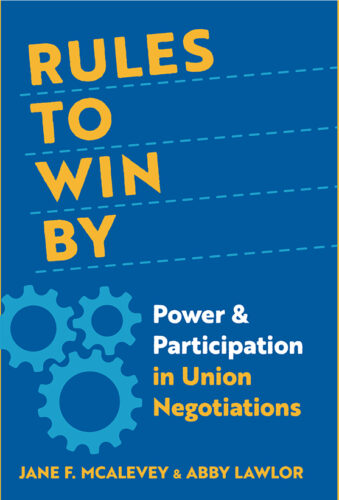 Buy Now
Buy NowAdvance Praise For Rules To Win By
“Negotiation should be a process of creative aggression, not technocratic dealmaking that fractures class consciousness. McAlevey and Lawlor persuasively show how democratized and disciplined mass participation
creates the power in confrontation required to win—for unionists and for all movements for justice. Here we can see abolition as life in rehearsal.”
—RUTH WILSON GILMORE, author, Abolition Geography
“At a time when union demand is higher than it’s been in almost a century, Rules to Win By is required reading. This book is armor for the generation of workers poised to gain power world-wide for the working class.”
—SARA NELSON, International President of the Association
of Flight Attendants-CWA, AFL-CIO
“McAlevey and Lawlor eloquently detail the approach to negotiations rooted in the practice of the pace-setting national union known as District 1199 over eighty years ago. We adhere to the same approach today as we did in the 1940s, 1950s, and 1960s. Read this book to understand why and how building fighting worker organizations will serve as the foundation for 21st century movements for racial, economic, and gender justice.”
—ROB BARIL, President, 1199NE (SEIU)
“As McAlevey and Lawlor convincingly and movingly show, the way for unions to win big is by engaging in open and democratic negotiations. But the wisdom in these pages is universal and applies well beyond
organized labor. Whatever cause you are fighting for, let this brilliant bookbe your guide.”
—ASTRA TAYLOR, co-founder of the Debt Collective and author of
Democracy May Not Exist, but We’ll Miss It When It’s Gone
Rules To Win By is a book for workers, unionists, tenant organizers, racial justice and climate campaigners, academics, policymakers and everyone who wants a more fair and democratic society. Drawing insights from recent hard-won union negotiation campaigns, organizer, negotiator, author, and scholar Jane McAlevey and Abby Lawlor, an organizer and labor lawyer, look to the workers leading some of the toughest fights today to provide a masterclass in participatory social change.
The book features six case studies from the last five years: Boston hotel workers, educators in New Jersey, nurses in rural Massachusetts and Philadelphia, reporters from the Los Angeles Times and Law360, and hospital workers in Germany fighting for their patients and their own lives in the pandemic. In each of the cases, workers used the collective bargaining process to achieve transformative contracts through deep organizing and member-driven strategy. All of the cases featured in Rules to Win By also underscore that workers need not—and cannot—wait for the PRO Act or other labor law reforms to successfully overcome employer union busting and win union recognition and life-changing collective bargaining agreements.
Rules to Win By offers practical tools and resources for any campaign. Unlike so many books on negotiations, it encourages readers to think beyond the shortcuts of verbal tricks and short-term tactics and to harness the power of ordinary people to win the public good. At a time when the right to strike is under attack around the world, and with a decision pending in the Supreme Court case Glacier Northwest v. International Brotherhood of Teamsters that could significantly increase the risks of striking for unions in the United States, these campaigns illustrate how fundamental the strike—and the strike threat—is to an effective system of collective bargaining.
About The Authors
Jane McAlevey is an organizer, negotiator, author, and scholar. She is currently a Senior Policy Fellow at the University of California at Berkeley’s Labor Center.
Abby Lawlor is an organizer and labor lawyer based in Seattle, Washington. She is currently a legal fellow at Public Rights Project.
Published by Oxford University Press